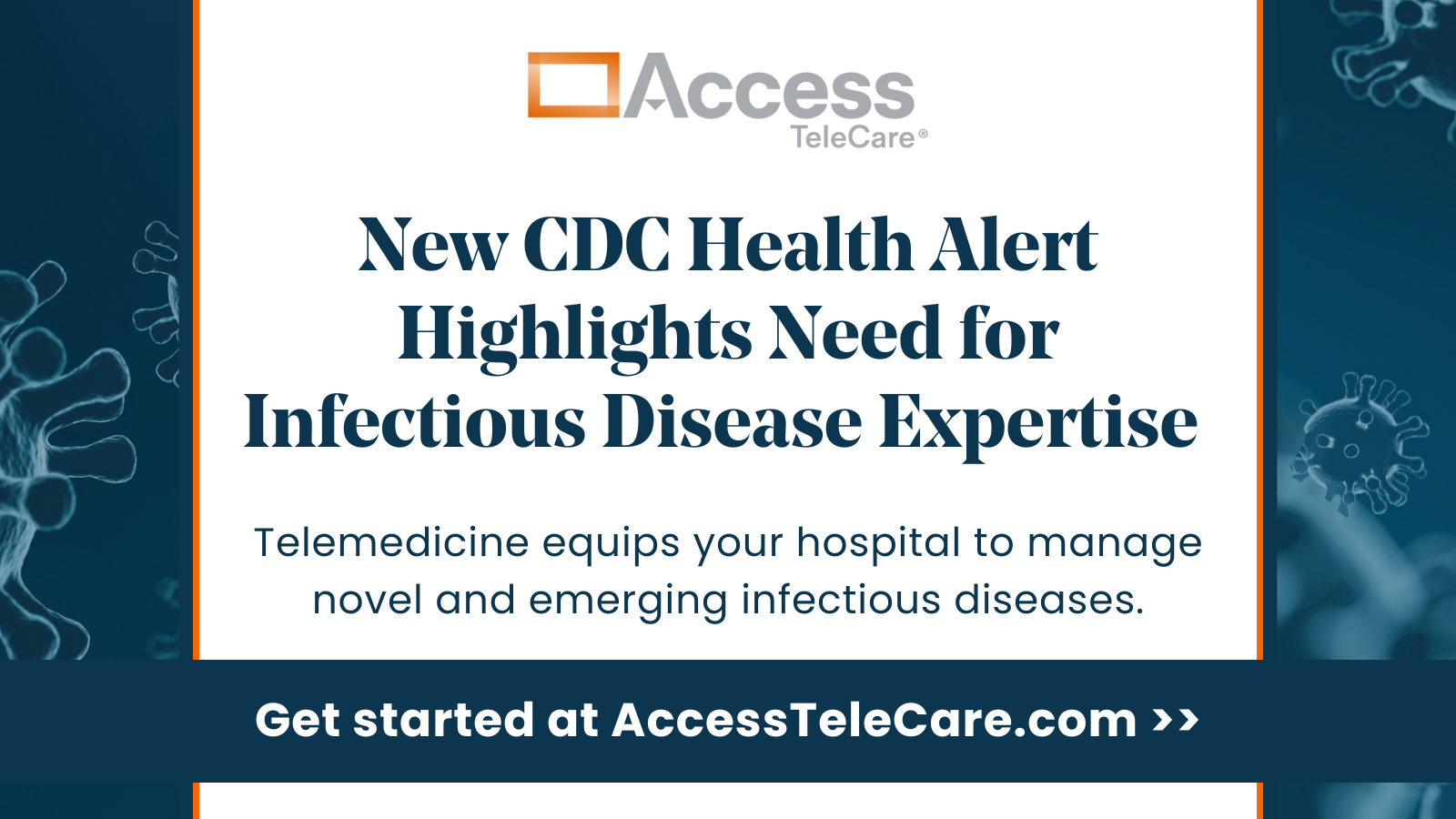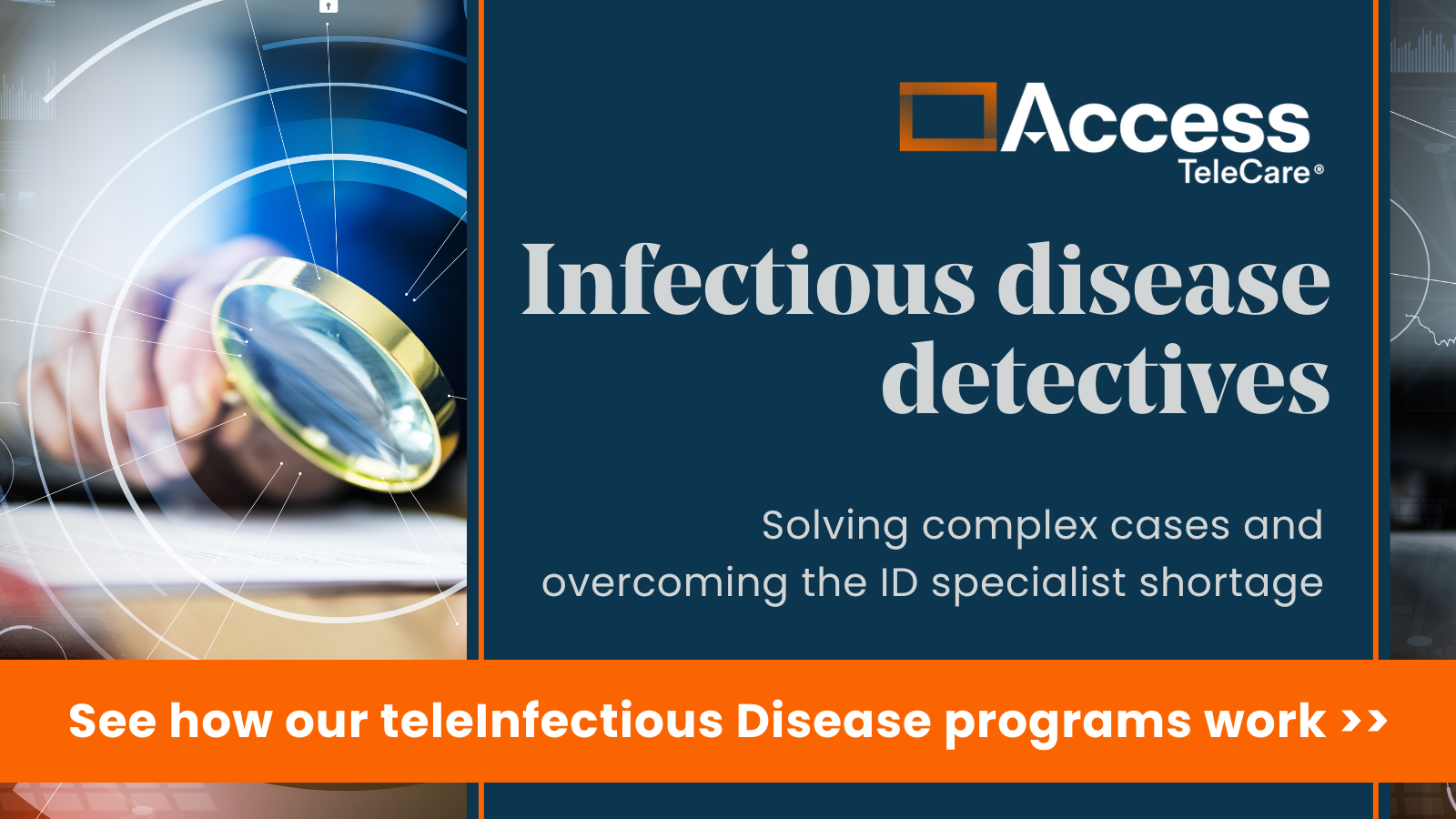Eighty percent of counties in the U.S. have no practicing infectious disease specialists, according to a 2020 study in the Annals of Internal Medicine. This translates to 208 million people without access to infectious disease care.
Yet, the lack of available specialists doesn’t correspond to a lack of need for infectious disease care. There were 3.4 million emergency department visits where infectious and parasitic diseases were the primary diagnoses in 2018, and more than 520,000 of those resulted in a hospital admission, according to the U.S. Centers for Disease Control and Prevention.
Through telemedicine, we can address this supply/need imbalance and ensure timely access to needed specialty care for patients as well as in-market patient retention for hospitals.
As an inpatient service, tele-infectious disease specialists diagnose and treat a range of infections — endocarditis, bacteremia, central-line associated infections, pyelonephritis, complicated UTIs, skin and soft tissue infections, cellulitis, diabetic foot infections, prosthetic joint infections, and osteomyelitis. We can support even more challenging cases, such as recurrent clostridium difficile, HIV/AIDS, meningitis, encephalitis, HHV-6 encephalitis, West Nile virus encephalitis, CMV meningoencephalitis, and HSV herpes encephalitis.
Throughout the pandemic, the tele-infectious disease specialists with Access TeleCare have also cared for hospitalized patients with COVID-19. While we don’t care for every COVID-19 patient at every hospital, some hospitals include infectious disease consultants as part of the care management team to evaluate and prescribe appropriate medications. Our tele-infectious disease specialists also work with hospitals to design protocols that adhere to national guidelines, such as from the Infectious Disease Society of America or the National Institutes of Health, which hospitalists and critical care teams can then use in treatment.
We deliver these specialty services all through telemedicine, but the experience for the patient and for the clinicians on the ground is the same as if we were there in-person. Our infectious disease specialists use the high-definition telemedicine cart to see and talk with patients, and we can even listen to the heart and lungs through the cart’s built-in stethoscope. It’s not uncommon for our specialists to detect heart murmurs that may not have been heard by other care team members on the ground.
And then, we provide notes directly into the hospital’s EMR. We can even place orders within that same EMR and provide preliminary recommendations to the consultation-requesting physicians, either by text or phone.
The benefits of infectious disease consultations are numerous. Research studies have documented:
- Reduced 30-day mortality rates, readmission rates, patient transfers, length of stay, and costs
- Improved outcomes, adherence to clinical guidelines for initiating appropriate antibiotics, and patient satisfaction
The chief medical officer at one of our partner hospitals offered another benefit of tele-infectious disease specialists: being able to admit patients from other hospitals. “Because we have infectious disease specialists on board, not only have we reduced transfers out, we increased transfers into our hospital system.
The evidence is clear that infectious disease consultation improves patient outcomes and hospitals’ patient retention. Telemedicine is the key to eliminating the barrier to delivering that consultation.
Please contact us to see how we can help your hospital build a tele-infectious disease program.
Dr. Le is board-certified in infectious disease and is a former Peace Corps volunteer, where she helped with the Ebola outbreak and vaccination campaigns for people in remote villages. She received her Doctor of Medicine from the University of Texas Health Science Center in Houston. She completed her internship and residency at the University of Texas Southwestern Medical Center in Dallas, where she was also Chief Resident. She completed her infectious diseases fellowship at Washington University in St. Louis, Missouri.







